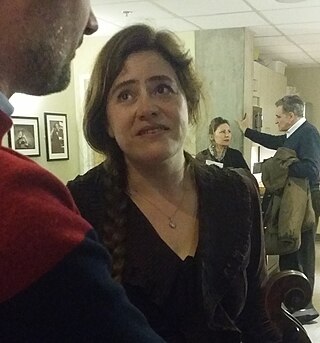Related Research Articles

Ridolfo Luigi Boccherini was an Italian composer and cellist of the Classical era whose music retained a courtly and galante style even while he matured somewhat apart from the major European musical centers. He is best known for a minuet from his String Quintet in E, Op. 11, No. 5, and the Cello Concerto in B flat major. The latter work was long known in the heavily altered version by German cellist and prolific arranger Friedrich Grützmacher, but has recently been restored to its original version.

Julian Lloyd Webber is a British solo cellist, conductor and broadcaster, a former principal of Royal Birmingham Conservatoire and the founder of the In Harmony music education programme.

Guilhermina Augusta Xavier de Medim Suggia Carteado Mena, known as Guilhermina Suggia, was a Portuguese cellist. She studied in Paris, France with Pablo Casals, and built an international reputation. She spent many years living in the United Kingdom, where she was particularly celebrated. She retired in 1939, but emerged from retirement to give concerts in Britain. Her last was in 1949, the year before her death.
The music of Sri Lanka has its roots in five primary influences: ancient folk rituals, Hindu religious traditions, Buddhist religious traditions, the legacy of European colonisation, and the commercial and historical influence of nearby Indian culture—specifically, Kollywood cinema and Bollywood cinema.
Natalie Clein is a British classical cellist. Her mother is a professional violinist. Her sister is the actress Louisa Clein.

Steven Isserlis is a British cellist. An acclaimed soloist, chamber musician, educator, writer and broadcaster, he is widely regarded as one of the leading musicians of his generation. He is also noted for his diverse repertoire and distinctive sound which is deployed with his use of gut strings.

Truls Olaf Otterbech Mørk is a Norwegian cellist.

Antony Cooke, is an American cellist, recording artist, former university professor, composer, and author of published books and articles on musicology and astronomy. Cooke's formal music and musicology training in London and subsequent career as a professional musician and recording artist are complemented by his intensive studies into astronomy.
The Harriet Cohen International Music Award was founded in 1951 by Sir Arnold Bax and others, in honour of the British pianist Harriet Cohen.

Bruno Canino is an Italian classical pianist, harpsichordist and composer.
Deshamanya is the second-highest national honour of Sri Lanka awarded by the Government of Sri Lanka as a civil honour. It is awarded for "highly meritorious service", and is conventionally used as a title or prefix to the recipient's name.

Emmanuelle Bertrand, is a French cellist.
James Barralet is a British cellist.

The Symphony Orchestra of Sri Lanka (SOSL) is based in Colombo, Sri Lanka, and is one of the oldest orchestras in South Asia.

Specializing in chamber music and Eastern influences in 20th-century music, British contemporary music ensemble Dreamtiger was created and directed by composer Douglas Young in 1974 while he was studying at Trinity College in Cambridge.
The Hungarian composer Zoltán Kodály wrote his Sonata for Solo Cello in B minor, Op. 8, in 1915. It was first performed in 1918 and published in 1921.
Danjulo Ishizaka is a German cellist and professor at the Berlin University of Arts and City of Basel Music Academy

Paul Hermann, also known as Pál Hermann, was a virtuoso cellist and composer.
Raphaël Chrétien is a French classical cellist and music educator.
Salvatore Lanzetti was an Italian cellist and composer of the late Baroque and early Classical era.
References
- ↑ "Rohan de Saram: Cello, Kandyan Drum; International Virtuoso Cellist; London; Sri Lankan". www.rohandesaram.co.uk. Retrieved 12 August 2017.
- ↑ "Rohan de Saram: Cello, Kandyan Drum; International Virtuoso Cellist; London; Sri Lankan". www.rohandesaram.co.uk. Retrieved 12 August 2017.
- ↑ MusicWeb International's Seen and Heard. "Aldeburgh Festival 2008 (6) : Rihm, Byrd, Xenakis, Rohan de Saram (cello) Exaudi, James Week (director), Aldeburgh Church, Suffolk, England. 20.6.2008 (AO)". www.musicweb-international.com. Retrieved 12 August 2017.
- ↑ Web(UK), Music on the. "Rohan de Saram on Berio and new musical horizons. Anne Ozorio - November 2006 MusicWeb-International". www.musicweb-international.com. Retrieved 12 August 2017.
- ↑ "Rohan de Saram: Cello, Kandyan Drum; International Virtuoso Cellist; London; Sri Lankan". www.rohandesaram.co.uk. Retrieved 12 August 2017.
- ↑ "Rohan de Saram: Cello, Kandyan Drum; International Virtuoso Cellist; London; Sri Lankan". www.rohandesaram.co.uk. Retrieved 12 August 2017.
- ↑ "Harmonic Labyrinth" . Retrieved 12 August 2017.
- ↑ "de Saram in Concert" . Retrieved 12 August 2017.
- ↑ "Rohan de Saram: Cello, Kandyan Drum; International Virtuoso Cellist; London; Sri Lankan". www.rohandesaram.co.uk. Retrieved 12 August 2017.